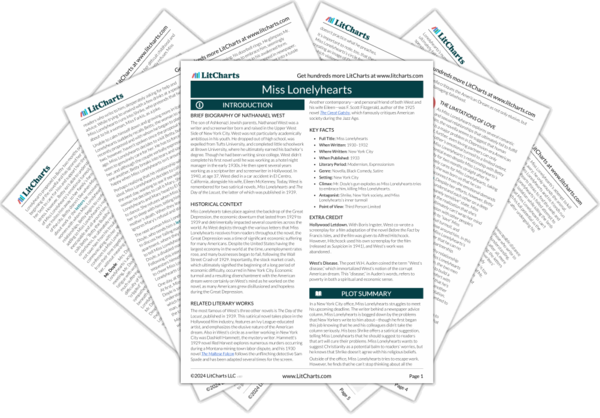Religion and Morality in Modern Society
Although Miss Lonelyhearts is, in some ways, motivated to write his advice column by his Christian beliefs and “love of humanity,” his progressively disingenuous relationship to his Christianity portrays religion as a coping mechanism that no longer has a place in a largely immoral, modernizing world. Surrounded by nonreligious individuals like Shrike, who makes fun of Miss Lonelyhearts for admiring Jesus Christ, and Betty, who changes the subject when Miss Lonelyhearts brings up…
read analysis of Religion and Morality in Modern SocietyThe Illusion of the American Dream
Rather than portraying American society as one in which everyone can achieve success, Miss Lonelyhearts portrays a society that both produces and profits off of human suffering. On the surface, Miss Lonelyhearts works a stable writing job that offers him a unique opportunity to make tangible changes in everyday readers’ lives. However, Miss Lonelyhearts conveys early on that his job has trapped him in a lifestyle that he can no longer handle. He finds himself…
read analysis of The Illusion of the American DreamThe Limitations of Love
As Miss Lonelyhearts explores several romantic and sexual relationships that ultimately fail to fulfill him, the novella seems to suggest that human disconnection is a major problem in Depression-era American society and that, further, even loving partners can only understand each other’s emotional turmoil to a limited extent. Upon first glance, Miss Lonelyhearts’s relationship with Betty appears to have potential even despite Miss Lonelyhearts’s decision to avoid Betty for two months straight after he proposed…
read analysis of The Limitations of Love
Isolation and Madness
Although Miss Lonelyhearts is surrounded by people to the point where he often wishes that he could escape them, he spends the duration of the novella feeling isolated from those around him. After all, Miss Lonelyhearts’s numerous attempts at romantic relationships ultimately fail to fulfill him, and he notes that even the time he spends with Betty, who does her best to be a supportive, caring partner, makes him feel bad about himself—and alone…
read analysis of Isolation and Madness






